Favorite Fiction of 2022
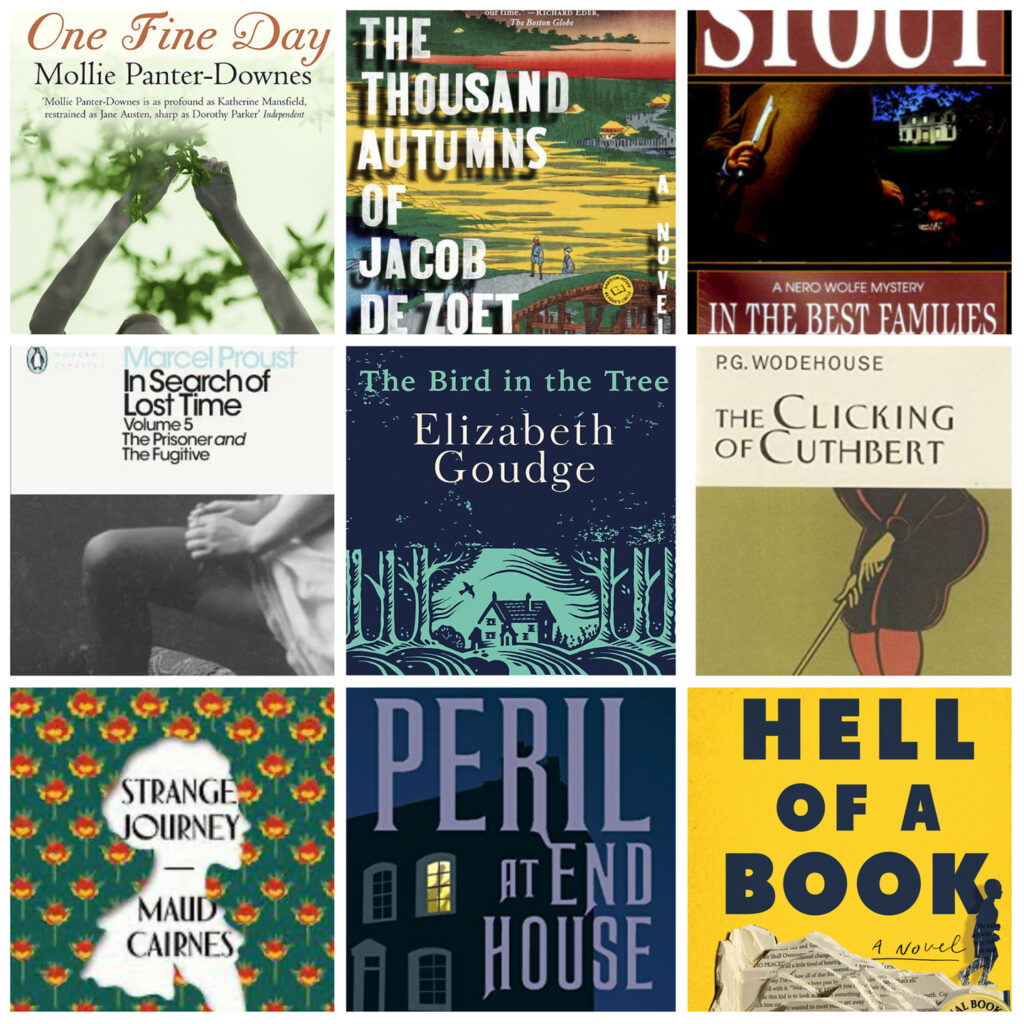
I had to separate out nonfiction and fiction, because it just isn’t fair to make The Clicking of Cuthbert go up against Twilight of Democracy. Once I did that, though, it became fairly easy to pick nine fiction books that perfectly represented my year in reading, and that I would wholeheartedly recommend to anyone. These were books that absorbed all of my attention, made me laugh or cry or think or all of the above, and gave me so much joy this year.
9. The Thousand Autumns of Jacob de Zoet – David Mitchell, 2010. This is the only other book of historical fiction I’ve ever read that I would say is on or near Hilary Mantel’s level. So glad I stuck with it through the weird stuff and medical stuff.
8. Strange Journey – Maud Cairnes, 1935. This incredibly delightful body-swap comedy was both an absorbing page-turner and a thoughtful novel that has stayed with me. I look forward to reading many more books from the British Library Women’s Writers series.
7. The Clicking of Cuthbert – P. G. Wodehouse, 1922. I read five by Wodehouse this year and it’s almost impossible to pick a favorite, because each one was hilarious and delightful. But I’ll pick this one because I don’t care one iota about golf so it was even more of a happy surprise how much I loved these golf stories.
6. In the Best Families – Rex Stout, 1950. As with spot seven, in a way this book is standing in as a representative example by the author. I read many more than five Nero Wolfe mysteries by Rex Stout this year, though! This isn’t where I would tell anyone to start, but it’s one I especially enjoyed myself. It’s the third in the “Arnold Zeck” trilogy sub-series, and that whole trilogy was just top notch mid-century crime with a mobster element, and was so well-written and often funny. In my family we just love these characters so, so much!
5. Peril at End House – Agatha Christie, 1932. Again, my favorite of a large number of books by the same author that brightened my year and got me through two different month-or-so episodes of sickness/recovery. I had read some Agatha Christie before this year – maybe a dozen mysteries altogether, many of them when I was about twelve – but this was the year I actually realized what a gift her endless cleverness and ceaseless labors at the typewriter gave to the world. To think of all the Agatha Christies I read this year, and all I still have to read! (To come clean, I read 13 of them. I won’t say how many Nero Wolfe/Rex Stouts I read, more than that). And Peril at End House, being a sinister and twisty mystery that features Poirot, I would put right at the top of the stack of those I’ve read so far.
4. Hell of a Book – Jason Mott, 2021. I raved about this book to all of my friends so I hope to get to discuss it in more detail with people soon – it’s definitely one of those books where trying to figure out what’s going on is an important part of your experience of the book. It’s so sad and poignant, and opened my eyes and heart in a new way to the experience of fear that is part of so many people’s lives because of their own or their children’s skin color. But it’s also, somehow, because the author is apparently a genius and an actual magician of words, extremely funny in places, full of astonishing turns of phrase, and just a great story.
3. The Prisoner – Marcel Proust, 1923. I wanted to fold down all the corners because there were incredible passages on every page. This is my first time through In Search of Lost Time and it has been so rewarding and just completely wonderful.
2. The Bird in the Tree – Elizabeth Goudge, 1940. This was actually a reread but I remembered so little of it that I actually think I was too young to understand it the first time I read it and that it didn’t count. (I was 24 or so then and am now 41.). I also just couldn’t bear to leave it out of my top books because I loved it so, so much. Some might find it morally heavy-handed or emotionally unrealistic, but a lady I am in my book group who is older and definitely much wiser than I am made an impassioned argument against that view, at our meeting on this book, and without giving too much of the plot away I’ll just say that I agreed with her and that I thought the book was emotionally realistic and wise, and also absolutely beautiful.
1. But my very favorite among all these books would have to be One Fine Day – Mollie Panter-Downes, 1947. This story of a single summer day a year after the end of World War II entirely captivated me with its emotional resonance, its main character whom I felt like I became while I was reading it, and its vignettes of daily life that were so extraordinarily evocative of a particular time and place. I loved the writing, and the way the beautiful descriptions seemed to flow from a deep love for England and a particular countryside in England.
I also love the fact that Tea or Books recommendations took two of my top nine fiction spots, since this was the year I became a devoted fan of that podcast. I have two entire shelves of “Tea or Books books” that are TBR, some pulled from elsewhere on my shelves as I heard them mentioned on the podcast, but many purchased from Alibris or Waterstones this year because I just couldn’t wait to get my hands on them, but I also couldn’t read them all at once! Every single one that I’ve read so far I’ve enjoyed, so even though I’ve told myself to stop buying more and just read the ones I have, I don’t regret the ones I’ve already bought at all.
If I were including rereads (other than Bird in the Tree…) I would need to put the three Jane Austen novels I read aloud to my children into the mix here somehow, as well as Their Eyes Were Watching God, North and South, and Lady Anna. So I like the rule that a lot of people follow where they don’t include rereads! I also would like to come back in a few days and add a top ten (or nine – because I don’t know how to do a collage of ten pictures, ha) books that I read aloud with my children, because this had to be one of our best readaloud years ever, too.
Cheers! Happy New Year and here’s to beloved friends, joyful memories, and great books in 2023!
Favorite Nonfiction of 2022
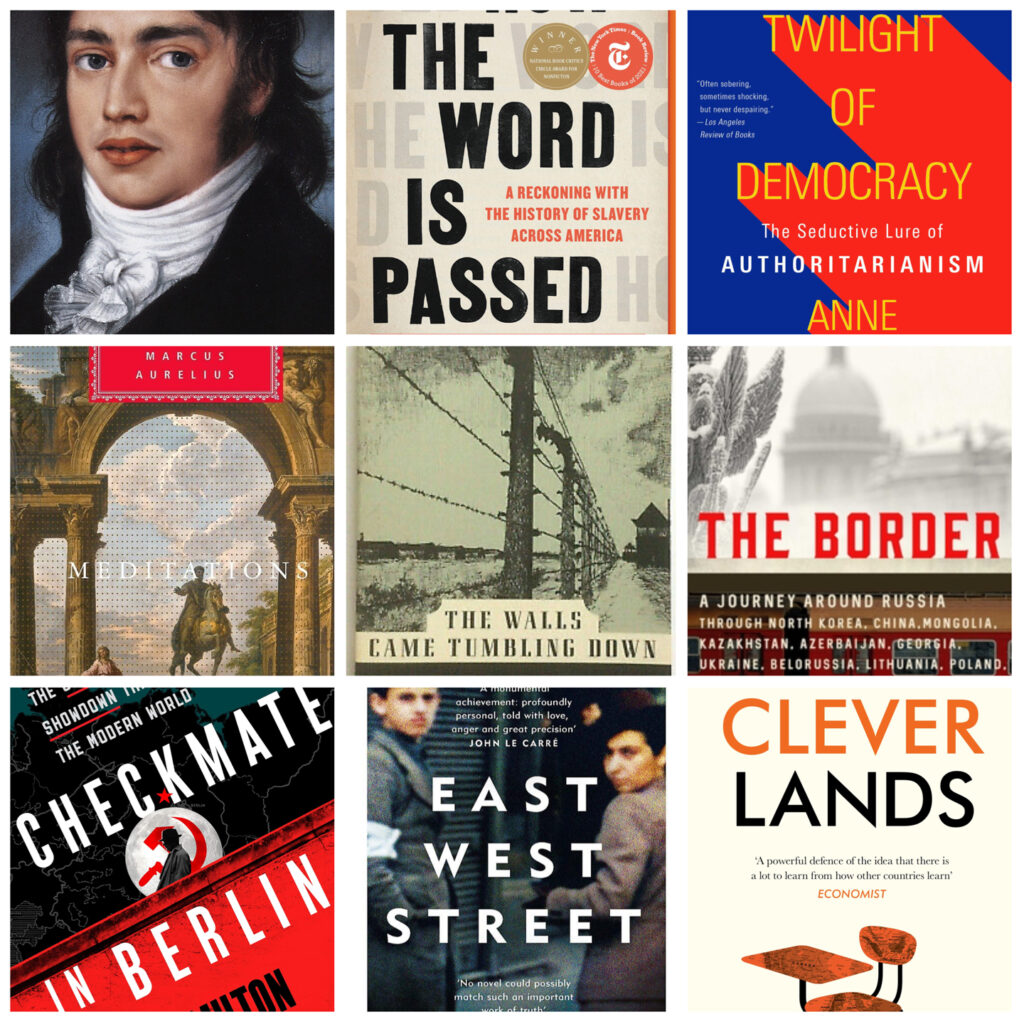
I had such a good reading year, and a good year in general! Life isn’t perfect but it is so very good.
I think now that I’ve separated out fiction from nonfiction I can at least make an attempt at ranking these in order the way some people do.
9. Cleverlands: The Secrets Behind the Success of the World’s Education Superpowers – Lucy Crehan, 2016. Not that the international tests are the final word in educational “success” – and the author doesn’t think they are either – but why do some countries do so well? There is so much to love about this book and so much to think about. I would read a book called Clevelands II in which Lucy Crehan visited a new tier of another five top performers.
8. Twilight of Democracy: The Seductive Lure of Authoritarianism – Anne Applebaum, 2020. So interesting, so thought-provoking. I never would have expected this to be such a personal book, as Applebaum includes many stories of her own friendships that have changed or even ended, as people she used to have so much in common with have gone in a different direction politically. I definitely want to read everything she’s written now.
7. Checkmate in Berlin: The Cold War Showdown that Shaped the Modern World – Giles Milton, 2021. So many things I should have known and didn’t! So many memorable and fascinating people, some of them infuriating and some of them inspiring. This book was so readable and interesting that I immediately bought two or three other books by Giles Milton and can’t wait to read them.
6. How the Word is Passed: A Reckoning with the History of Slavery Across America – Clint Smith, 2021. I’ve read not that many nonfiction books about race and the legacy of slavery in America, but maybe ten? Eight? In my opinion this one is the very best of the ones I’ve read, and is so accessible and so convincing that I think if it were widely included in high school curricula it would change the world.
5. The Border: A Journey Around Russia Through North Korea, China, Mongolia, Kazakhstan, Azerbaijan, Georgia, Ukraine, Belarus, Lithuania, Poland, Latvia, Estonia, Finland, Norway and the Northeast Passage – Erika Fatland – translated by Kari Dickson, 2020. This was a fascinating travel narrative as well as a geopolitical primer for a part of the world I know all too little about. If you include this book as a book about Russia, which it really sort of is, I read five books about Russia this year, which isn’t nearly as many as I bought. (I think buying books about Russia felt like a coping mechanism as things got scary.)
4. Coleridge: Early Visions, 1772-1804 – Richard Holmes, 1989. This was the best biography I’ve ever read so of course it was among my top books of the year. I think even for a reader without any special interest in Coleridge, anyone would love it as a study of personality, creativity, and the resistance we all meet with as we try to live the lives we aspire to. The second volume is at the top of my stack for 2023.
3. East West Street – Philippe Sands, 2016. A devastating story of the Holocaust and the Nuremberg Trials that weaves together a number of different threads, including the author’s own family history. It was so heartbreakingly sad and so hard to read in one way, but in another way it was so readable and so important that I felt like I couldn’t put it down, as if my own life depended on the story. And truly, our lives and those of future generations do depend on people knowing, at least in part, what happened, and understanding, at least in part, how it happened.
2. Meditations – Marcus Aurelius, ~170-175 AD; translated by D. A. Rees, 1992. Obviously, a book for all time, no one has to be told that this is worth reading! I’d love to read it every year.
1. The Walls Came Tumbling Down – Henriette Roosenburg, 1957. Nine amazing books, any of which would merit rereads, but this book and Meditations are two that I literally would read every year. This is a World War II memoir but it begins when the war ends, and there are so many moments of beauty, loyalty, steadfastness, and courage – all in the midst of utter chaos and so much evil. One of my book groups has agreed to read this with me in 2023! I can’t wait to see if they love it as much as I do.
I can’t believe that I read so many great nonfiction books this year that The Escape Artist, Nothing to Envy: Ordinary Lives in North Korea, and Empire of Pain aren’t even making it into my top nine. I’d better publish this post, quickly, before I start reconsidering and trying to squeeze them in!
Reading August 14 – September 13, 2022
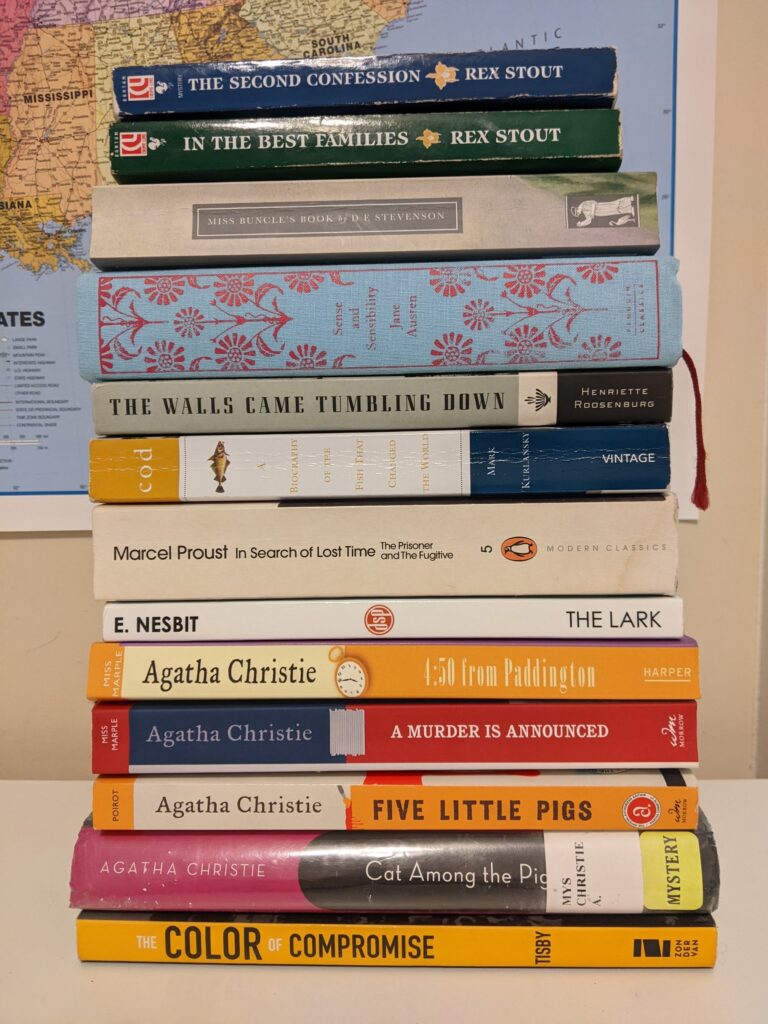
I was sick for about three weeks of this month – that’s why I read six mysteries. Eternal gratitude to Agatha Christie and Rex Stout, they’re there for me when I need them! I’m fine now, and so is everyone else in my family. We had a very nasty virus (not that virus).
The Second Confession – Rex Stout, 1949
This is the second of the three “Zeck” books – Arnold Zeck is a supercriminal and he appears at least peripherally in And Be a Villain, The Second Confession, and In the Best Families. This trilogy might actually be a good place to start for someone new to Nero Wolfe. I’ve been reading all of the books more or less in order, but I think these give a better taste of Nero Wolfe’s world than the first three would. You can’t go wrong though, I’ve yet to read a bad one! The Second Confession was extremely clever and interesting and I loved it.
In the Best Families – Rex Stout, 1950
And this one is I believe my very favorite of the 18 Nero Wolfe books I’ve read. You would need to read at least the other two Zeck books first and I think it would be best to have read quite a few of the books before this one. I know the fans are out there – I notice that every single time I add a Nero Wolfe book to my Alibris cart and don’t check out right away, it’s gone the next time I look! Anyway, this book revolves around questions of blackmail, secrets in marriage, plausible deniability, and criminal networks set up so that the person who’s actually at the very center is beyond the reach of the law. This last is an idea that keeps coming up other places in my reading, especially throughout the book Rogues by Patrick Radden Keefe which I’ve just finished – a collection of his long-form journalism from the past 15 years or so, I believe all for the New Yorker. Anyway, In the Best Families is fascinating and has aspects that are completely different from any of the others I’ve read in the series. Five stars!
Miss Buncle’s Book – D. E. Stevenson, 1934
This was so lovely. I just adored Miss Buncle and the spunk she showed by responding to her suddenly decreased (Depression-era) “dividends” by writing a book. She uses the material she finds to hand and writes a very thinly disguised story of almost everyone she knows. When the inhabitants of her village read the book and find themselves in it, down to the smallest detail, mayhem ensues. Miss Buncle is diffident and timid and the kind of woman everyone underestimates, but her book shows she’s also a very astute observer, with opinions of her own, however little she expresses them in daily life. I thought this was a marvelous plot and I heartily enjoyed every page.
Sense and Sensibility – Jane Austen, 1811
Another readaloud with my children and we enjoyed it almost as much as Pride and Prejudice – actually one of my children liked Sense & Sensibility even better. I was sorely tempted to make Colonel Brandon 22 or so instead of 35 as I read, but instead just explained that people didn’t know as many people in those days, especially because distances were so different before engines; so they chose their marriages based on a much more limited pool of applicants. I didn’t want them to be disgusted by the age difference in the book (or in other even more wonderful Jane Austen books (book) they might read later..) but I also didn’t want them to think it was normal. I think we struck a balance. Anyway! This was my own third reading of the book and I was again delighted and surprised by how funny it was, and how interesting the minor characters are. We did have such a fun time reading this; it will always be such a happy memory from this summer for me. It was a standing joke that on the few and far between occasions when Margaret came into the story, one or the other of the kids would be sure to say “Wait – who’s Margaret?” And any time we can work the expression “One leg of mutton drives another down!” into the conversation, or just say it for no reason, we do. Dear, vulgar, but so kind, Mrs. Jennings!
The Walls Came Tumbling Down – Henriette Roosenburg, 1957
What can I say about this book in a paragraph!? This goes right to the top, the best of the best, one of the greatest books I’ve ever read and one I hope to return to again and again. It is the story of three young women and a young man, all Dutch and former members of the resistance against the Nazis, who have been sentenced to death but not actually executed. Roosenburg writes only very briefly about their time as prisoners, and then most of the book is dedicated to their journey home as the war is ending. I’ve never read anything that gave me such a vivid, living picture of the chaos of the end of the war. Europe in ruins, millions of refugees/displaced persons – power structures of years’ standing suddenly turned upside-down – people of all nationalities trying to get enough food, trying to figure out what’s happened, and trying to remain human in the midst of terrible and terrifying circumstances. And most of all, trying to get home!
I want everyone I know to read this book, and in fact, I want everyone in the world to read this book. But do not read the introduction by Noel Perrin, if you find the Common Reader edition, until after you’ve finished the book. (Why do writers of introductions so often think that what readers are looking for is a brief summary of everything that happens in the book?) I’ll note too that I would recommend this book to students, but only depending on age and maturity level, as there are descriptions of the constant threat of sexual violence that women in this time and place were living under. I would say 11th grade and up. I may read it aloud to my own children as soon as next year and just leave a few things out. It is a book that gives you hope for humanity.
Cod: A Biography of the Fish that Changed the World – Mark Kurlansky, 1997
20 Books of Summer, and actually so was The Walls Came Tumbling Down. I subbed this in off of my substitutions stack in place of The Seven Storey Mountain, which was both too long and too sad at the beginning for me at this time. I would recommend Cod and it was interesting to read it partly at the same time as The Boat Who Wouldn’t Float by Farley Mowat, which is set on and around Newfoundland. I wrote a little about this book already in my 20 books of summer update so I’ll move on –
The Prisoner – Marcel Proust, 1923
This was another of my 20 Books of Summer, and I wrote a little about it here.
The Lark – E. Nesbit, 1922
My 12-year-old daughter, 14-year-old son and I all read this (separately, not aloud) and were so charmed by it. I think all of us have read all of her books for children so it was really enjoyable to read her in a similar but different vein. I love her sense of humor!
4:50 from Paddington – Agatha Christie, 1957
I picked this up because I loved the Tea or Books episode when they compared this one to Whose Body by Dorothy L. Sayers (with no spoilers, thank you very much!). I love Lord Peter Wimsey as if he were one of my own family so it was fun to hear Simon take such a different view; and it’s just a good discussion topic because while both books have their points, I do think, now that I’ve read this one, that it’s definitely the better mystery. It’s very good! My favorite among the Miss Marples I’ve read.
A Murder is Announced – Agatha Christie, 1950
I didn’t enjoy this one as much (even though I think it’s very well plotted), simply because I realized halfway through that I’d already seen the televised version about 17 years ago. I hadn’t loved the televised version, mainly because it seemed so ridiculous at the end the way everyone in the village is sitting around, so calm and smiling together, as the vicar strokes the cat and they go over how the murderer was discovered. Several of their closest friends having died or proved to be homicidal maniacs, so you would think at least some of them would be at least a little bit upset; but this doesn’t really bother you in the book, maybe because although you have the dialogue of that final debriefing conversation you’re free to imagine their mien and demeanor as you will. Anyway, I definitely won’t watch another Christie episode without having read the book, and I think I would have thought this was a great mystery if I hadn’t seen the episode.
Five Little Pigs – Agatha Christie, 1942
Here we have a poisoned artist, and a betrayed wife who died in jail after being convicted of his murder. Their daughter, now grown, believes her mother was innocent and wants the truth. I love the way I constantly think “Hmm, this one isn’t quite as hard to guess as the others, because this time I’ve got it.” And then I turn out to be wrong! And it always makes perfect sense once you know. This was another really good one, excellent characters, great plot, easy to keep the characters straight because you have the piggies rhyme to help you along. The puzzle in this one probably is a little easier to guess than average, because my 14-year-old reports that he actually did guess it correctly fairly early on. We’re all on an Agatha Christie binge in my house right now, which is fun.
Cat Among the Pigeons – Agatha Christie, 1959
This is a novel of international intrigue and “spy stuff” as well as murder, and Poirot doesn’t come into it till almost the very end. I loved the particular way he was brought in, and really enjoyed his role in the book. Overall I would put it in the lower half of the Christie novels I’ve read (I seem to have read 19 of them), but I have yet to read one I actually didn’t like and this was a good comfort read while sick.
The Color of Compromise: The Truth about the American Church’s Complicity in Racism – Jemar Tisby, 2019
20 Books of Summer. Not at all usual for me that I only read one book that was written in the 21st century this month. I think I am pretty much the last person I know to have read this, and it was well worth reading. I especially appreciated the exploration of the words and deeds of so-called “moderate” American pastors during the 1960s; for example, the group of ministers who wrote to the local paper while Martin Luther King Jr. was in the Birmingham Jail, and said:
“We are now confronted by a series of demonstrations by some of our Negro citizens directed and led in part by outsiders. We recognize the natural impatience of people who feel that their hopes are slow in being realized. But we are convinced that these demonstrations are unwise and untimely.”
(136)
Tisby’s commentary on their letter is so perfect.
“What comes through in the letter, more than anything else, is their reasonableness. … This letter from white Christian moderates illustrates the broader failure of the white church, a failure to recognize the daily indignity of American racism and the urgency the situation demanded. These clergymen likely had good intentions, but they did not realize that the talking and negotiating for which they advocated had been attempted and had yielded little to no progress. They denounced the violence that direct action would supposedly incite, but they did relatively little about the countless lynchings, church bombings, and beatings black people across the nation suffered at the hands of segregationists.”
(137)
That’s all just the merest glimpse at one portion of the book, but hopefully it shows how well Tisby communicates this particular aspect of American history, including episodes that probably wouldn’t make the cut in a book that was about the wider culture and not specifically about the church. Relevant and thought-provoking.
The Prisoner – Marcel Proust
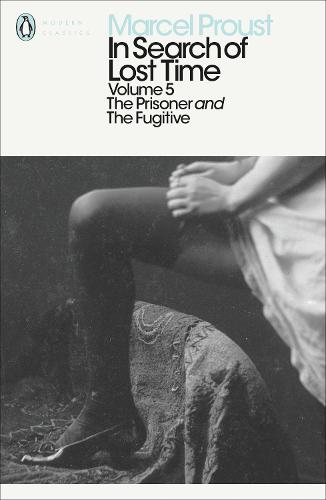
The Prisoner is the fifth of the seven books of In Search of Lost Time; my Penguin edition combines parts five and six, but I have only read up through The Prisoner. It was absolutely amazing; and I would say that either the novel as a whole has been teaching me how to read itself, or this volume is a little easier to read than some of the others. Not that you could read it without reading the others, but if someone were to start the novel and get bogged down in the nearly infinitely long party scene in The Guermantes Way, for example, it might help to know that not all the books of the novel follow that pattern. In fact, parts of this one are quite pacey, and I also never stop marveling at how Proust’s writing and his unique view of the world transform the underlying story and make it utterly transcendent.
I was also fascinated that in The Prisoner Proust raises questions about whether the transcendent beauty of certain pieces of art or music might indicate something more.
“It seemed to me, when I gave myself up to the hypothesis that art might be real, that music could convey not just the simple, nervous excitement of a fine day or a night of opium, but a more real, more productive ecstasy, or so I felt. But it is impossible that a sculpture, a piece of music which gives us an emotion that we feel to be higher, purer, truer, should not correspond to a certain spiritual reality, otherwise life would have no meaning.”
p. 346
But it’s a shame to excerpt it because you really have to read it in the context of the book and of all of the first five volumes, the Vinteuil sonata, the “little patch of yellow wall,” and much more. It’s just all so beautiful, and I want to read it again and again.
The actual story of The Prisoner is something I can’t relate to at all, and I think I laughed out loud when I read this sentence (which also must be one of the shortest in the novel): “By love, I mean here a kind of mutual torture.” (96) Although that’s well outside of my own experience of love, every page brought new insights and delights that kept me reading, even though I did sometimes flip forward while reading just to check if there was a paragraph break coming anytime soon (answer: no) so that I’d be able to rest my eyes and mind and take a little breather, even just for five character spaces.
It sounds like The Fugitive may take the main character to Venice, which I’m really looking forward to reading about through Proust’s eyes.
“…I wanted to come face to face with my Venetian imaginings, to see how this divided sea held within its coils, like the windings of the river Ocean, an urban, refined civilization which, cut off by azure bands of water, had developed in isolation, had had its own schools of painting and architecture – a fabulous garden of fruits and birds carved in coloured stones, flowering in the middle of the sea which daily refreshed it, lapping with its tides the bases of the columns and casting on the deep-carved capitals watching in the darkness like a sombre blue gaze, patches of ever-moving light.”
p. 382
Reading July 14-August 13
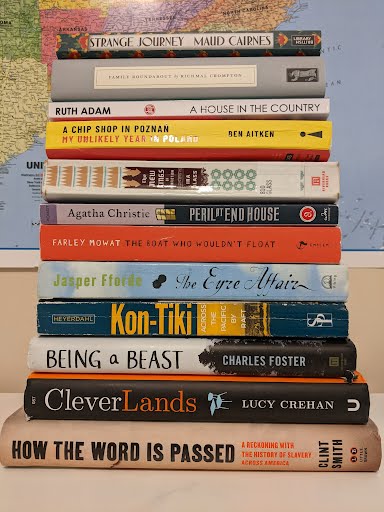
See the top three books on this stack? This was the month my Tea or Books recommendations started to arrive in the mail! That’s been one of the highlights of this year so far for me. In my 20s, with access to a very large library system teeming with out-of-print books, I read everything I could get my hands on by Elizabeth Goudge, E. F. Benson, Muriel Spark, Evelyn Waugh, Emily Eden, Barbara Pym, and Ivy Compton-Burnett, among others. I didn’t know about book blogs then, and once I’d read everything my library had by a certain author, my means of knowing which author to start on next were very limited.
Then we moved to the southeast and our new library, while excellent for its size and budget, was much smaller and had mostly newer books, as far as I could tell. Over the past ten years I’ve made several trips to the U.K. and have combed both new and used bookstores there and brought home many books from each trip. (Or shipped them home…a sweetly bemused lady in a post office in Windsor once asked us, “Don’t they have books in the states?”) I’ve also bought more and more books online and have definitely read some fantastic midcentury books, including mysteries, World War II memoirs, etc.; but I am truly thrilled just this year to have happened upon the beautiful world of book blogs, the Tea or Books podcast, Furrowed Middlebrow reprints, British Library reprints, and Persephone Books. Not to mention the growing list of formerly out-of-print books that have been newly re-released by mainstream publishers, even stateside, and many of which are now newly available even in my own local library! I’ll never lack recommendations for this category of book again, and I think it’s just completely wonderful that so many formerly forgotten writers have found a new readership and new appreciation.
I’m sure I’ll keep raving about that, but for now, here’s what I read July 14-August 13. Not in order (just size order, from how I stacked them).
Strange Journey – Maud Cairnes, 1935
This was everything I’d hoped it would be. I think body-swapping stories are so appealing, since of course we all wonder what it would be like to be another person, and Laughing Gas, which shares that premise, has been one of my very favorite Wodehouses (1936, by the way – maybe the mid-thirties produced a bumper crop of body-swap comedies?). Strange Journey is full of wonderful lines and moments, and I just loved the sensible way the middle-class main character approached the problems the upper-class character she swapped with was dealing with (or not dealing with). They both helped each other, in different ways, and it was just a joy to read.
(This was on my stack of possible alternates for 20 Books of Summer, and I decided to sub it in for The Temporary European, by Cameron Hewitt, which I did not finish. Something about his tone annoyed me. I sensed he had spent too much time in conversations with people who depended financially on his recommending their restaurant, bed and breakfast, or whatever, in the guidebooks.
Also, he used the word ‘impactful.’)
Family Roundabout – Richmal Crompton, 1948
The first Persephone I’ve ever read as a Persephone – the first of very many, I hope! (There are a few Persephone titles I’ve read in other editions, but not many. A whole new world) And I loved this book. In my family we all laugh like hyenas at the William stories and I had no idea until recently that Richmal Crompton had written anything else. Family Roundabout is a page-turning, gossipy story of two large families in a small English village, including one family matriarch who rules her family with an iron fist, and another, somewhat more aristocratic, who doesn’t rule her family at all but is always glad to see them (except when she’s in the middle of a good book). The relationships within and between both families had a lot of nuance, and for me, this was a perfect summer read.
A House in the Country – Ruth Adam, 1957
The description of this book really gripped me and I couldn’t wait to read it, after hearing Simon mention it on a years-old Tea or Books episode. A group of friends living together in London during the war get through the Blitz by daydreaming about renting a house together in the countryside once it’s over. You know from the very beginning that the reality doesn’t live up to their castle in the air, but you still can’t put it down as you turn the pages to find out what’s going to go wrong. There’s a fascinating cast of major and minor characters, a very engaging and sympathetic narrator, and an overwhelming amount of great period detail. This is ostensibly fiction, but I have a feeling it’s pretty close to memoir. It got darker and sadder than I had expected, but I don’t mean that in a bad way, and I would definitely recommend it to anyone interested in the time period.
A Chip Shop in Poznan – Ben Aitken, 2019
20 Books of Summer. In the year of the Brexit vote, Ben Aitken decided to pack up and move from the U.K. to Poland. He spent a year working odd jobs and experiencing a part of Europe he’d known very little about; he journaled throughout the year, and this is his journal. He weaves in a little history, some reflections on immigration and politics, and a lot of people-watching. This was interesting and fun to read and I found the author likable; I would definitely read another of his books.
The New Kings of Nonfiction – ed. Ira Glass, 2007
20 Books of Summer. This was flawed but great, I plan to write about it in more detail here.
Peril at End House – Agatha Christie, 1932
This must be one of her best! It’s a Hercule Poirot and the classic set-up where we encounter a small cast of characters, one of whom we know must be responsible for the repeated attempts on this young woman’s life. I won’t say more but this was a very, very good Golden-Age mystery and classic Poirot.
The Boat Who Wouldn’t Float – Farley Mowat, 1969
A very funny readaloud. (I made some on-the-fly edits to make it appropriate for all the ages we have in our family.) We love reading about boats, and since we made I think either seven or eight failed attempts to take our own motorboat out on the lake this summer – the mechanic kept saying it was fixed and acting like it was our fault and we were crazy – we finally took it to a different mechanic – anyway, it was topical. At least we were never out in the middle of the Northern Atlantic with no radio as the water level in the cabin rose and rose! (As a matter of fact, we never got more than ten feet from the dock.) I didn’t know much about this book going into it, so I was pleasantly surprised to learn a lot along the way about Newfoundland and its surroundings, Saint Pierre and Miquelon, etc. I really want to go there now! NOT by boat though.
The Eyre Affair – Jasper Fforde, 2001
My third reading of this book, this time for book group – and I was so pleased that almost everyone in my group loved it. I didn’t really like it myself the first time I read it – at least, I thought it was fine, but I didn’t feel any need to read on. Then another friend who’s a trusted source of recommendations enthused about Fforde about ten years later (~2015), and I revisited The Eyre Affair and quickly went on to read the rest of the series – they just keep getting better, and they are just so fun, so funny, and so extremely clever. It is an alternate reality where literature is a matter of life and death, in fact literary and high culture are popular culture, and there is time travel. The main character, Thursday Next, is a strong and capable woman, not at all a stereotyped heroine though, and the books just teem with ideas and with humor.
Although Fforde jokes about the BookWorld only having a limited number of plot devices that are endlessly recycled – so that characters swear at each other by saying “Why don’t you go to Human Drama and do a Plot Nine!” (Plot Nine is where a character returns to his hometown to be reconciled to a dying parent) – Jasper Fforde throws plot twists into this series that I have never seen in any other book in any genre. I think he is just brilliant and I read whatever he writes, even though these Thursday Next books and Shades of Grey are to me the pinnacle of what he’s done so far. I’d love to now reread the whole rest of this series. My 14-year-old read them all for the first time this summer and he loved them just as much as my husband and I do.
Kon-Tiki: Across the Pacific by Raft – Thor Heyrdahl, 1948
I had read this before and adored it, and this time I read it aloud to three of my kids as part of their school year. It was a great readaloud, and I did some on-the-fly editing to focus a little more on the adventure and less on the theory the adventure set out to prove. Not long after WWII, Thor Heyerdahl roped in five friends and set out to travel on a handmade balsa raft from Peru to the Pacific Islands, to demonstrate that people could have done the same in the distant past. It’s a fantastic true adventure story and you can’t help but love these six Norwegians. Some of the best parts are the descriptions of the wildlife they encountered out in the middle of the Pacific, hundreds of miles from any shipping route, let alone any island.
Being A Beast: Adventures Across the Species Divide – Charles Foster, 2016
I loved this and wrote about it here.
CleverLands: The Secrets Behind the Success of the World’s Most Successful Education Systems – Lucy Crehan, 2016
20 Books of Summer. So thought-provoking! I’ve always followed the results of the international tests and wondered about the specifics of why various economically similar countries get such different results. So much to say here, I should really write more in detail about this so I’ll remember what I learned! For now I’ll just say it was great and I highly, highly recommend it to anyone interested in education (which should be – everyone?)
How the Word is Passed: A Reckoning with the History of Slavery Across America – Clint Smith, 2021
For this book, the author visited five sites with strong connections to the history of slavery in the U.S. – Monticello, Angola Prison, Whitney Plantation, Blandford Cemetery, New York City, and Goree Island in Senegal – talked with the people in charge, took several tours, talked to other tourists, and wrote these engaging and interesting (but disturbing and hard) chapters about each one. It was extremely effective and instructive. If everyone in this country read even just the chapter on Blandford Cemetery, we would be living in a different world!
Blandford Cemetery, which I had actually never heard of before, is a huge memorial to the Confederate war dead, really not at all far from where I live, and this chapter confronts head-on the “Lost Cause” mythos which reinterprets the Civil War as having been fought for state’s rights and in response to northern aggression. “Very little to do with slavery, two sides to every story, nothing to see here!” Contra all that, it was incredibly powerful to read pages and pages of direct quotes from the text of each Confederate state’s Articles of Secession, besides other contemporaneous quotes from various Confederate leaders. You can never get to the end of how much the truth matters. One excellent reason, among so many reasons, to read.
20 Books of Summer – Update
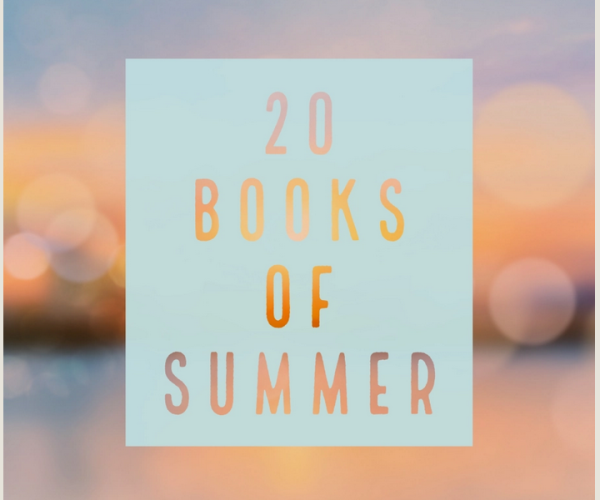
It has been a great experience joining in with Cathy for 20 Books of Summer and something I hope to do other years, whether I blog about it or not! I’ve loved reading about other people’s experiences too and have found many new book blogs I love and lots of very promising book recommendations.
I knew I would read 20 books this summer, but I wondered whether I’d be able to read 20 specific books that I had chosen ahead of time. Often when I plan to read something that means I particularly won’t read it. So that made it a really good challenge and full of interest, and I have persevered through some books I would ordinarily have gotten overwhelmed by and set aside. I would really have missed out, because the books I’ve read have been by and large phenomenal! I think this is going to be my best reading year ever.
We didn’t finish our school year till near the end of July, and then our family has been sick most of August (just a really bad virus – but not that virus) – so I decided several weeks ago that despite having started this challenge June 1st, I would consider summer to end on September 22. So here’s where I am:
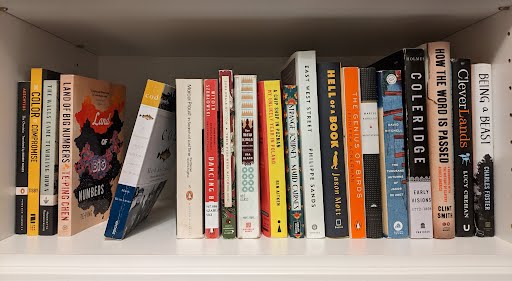
So much goodness on this shelf, it does my soul good just to look at it and remember how amazing so many of these books have been! Of the 16 I’ve read, there were 11 non-fiction and 5 fiction. I think that’s quite a bit more non-fiction than I normally read, which is part of what made it a good challenge! I don’t know how to decide which ones were the very best because they were all so different and I enjoyed them all so much, but for different reasons and in different ways. East West Street and How the Word is Passed are probably the two I’d be most likely to recommend to others because those are the two that I think my friends would be most likely to love. Of the 16, the ones I’m most likely to read again are probably Meditations, CleverLands, and Hell of a Book – Meditations because it is full of much-needed wisdom for life; CleverLands because it’s extremely relevant to my occupation of educating my children at home, and also full of thought-provoking ideas; and Hell of a Book because I’m almost definitely going to read this with one of my book groups so I’ll want to read it again for that (and also, it was great!). The only one that already was a reread was Their Eyes Were Watching God (what a book!). I would reread any of these books, though, except perhaps Dancing Bears and the earlier chapters of Genius of Birds.
There were two books that I subbed in from my alternates stack. The original two that are missing here are The Temporary European and Seven Storey Mountain. I did not like Temporary European (or maybe I was just jealous!), and I still may read Seven Storey Mountain someday, but at the moment I didn’t want to read about him losing his mother when he was a young child. Also, it was really long. I subbed in Strange Journey by Maud Cairnes, which was pure delight from start to finish, and Cod: A Biography of the Fish that Changed the World, by Mark Kurlansky, which was also very good. I thought it was going to be a sort of quirky look at history, an exercise in seeing “a world in a grain of sand.” But as I learned, it isn’t really all that quirky to write (or read) an entire book about cod, because it genuinely is a very important topic that touches on so many more things than I could ever have imagined. It was also much more sad than I expected because, knowing nothing at all about cod going into the book, I was blindsided by the fact that it is a major instance of humanity’s tendency to take and take, and to find ever new and more efficient means of taking, as we assume nature will always replenish our depredations. The book was published in 1997 and I have about a dozen things I want to follow up on to find out what’s new on that topic since then.
I’m looking forward to reading those last four over the next few weeks, and I think I can definitely do it. They’re all pretty short and I’ve made a bit of a start on Color of Compromise.
Over the time period from June 1st till the end of August I also read 18 other books, half of which were mysteries and all of which were fiction! (And I read or finished reading several others aloud to my kids.) I suppose I restored my normal fiction/non-fiction balance by just reading a LOT this summer and reading lots of books that were short, page-turning, and undemanding. All together this is a lot more than I normally read, and it’s partly because I was too sick for part of August to do anything but read, or lie there listening to an audiobook. I am so thankful for books and for the fact that there’s always a book for every occasion, whether it’s 4:50 From Paddington to get you through the worst part of a really bad cold, or Proust’s The Prisoner to stretch your mind in new directions and leave you lost in amazement at all the things that literary language can do.
Reading June 14-July 13
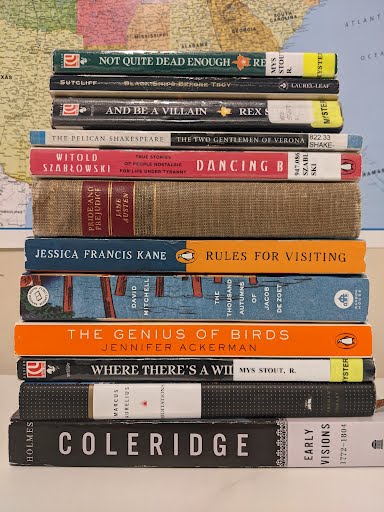
Not Quite Dead Enough – Rex Stout, 1944
I adore detective Nero Wolfe and his faithful assistant Archie Goodwin, and have read so many of these in the past year, including three this month. The plotting is very good and the characters are delightful. It’s also just really fun to read about early- and mid-20th century Manhattan, the city that’s still there underneath the NYC we know and love today. There are four of us in my house who are old enough to read and enjoy these, so being able to pass them around the family and compare notes as we read them adds a lot, as well. Not Quite Dead Enough was a top favorite of the series, taking place as it does in the midst of World War II. The volume actually comprises two novellas, Not Quite Dead Enough and Booby Trap. There are surprising developments and new directions for our beloved characters in both of these!
Black Ships Before Troy – Rosemary Sutcliff, 1993
A readaloud with my 2nd– and 4th-graders, this children’s retelling of the Iliad was, I thought, very successful. I’m not really fond in general of retellings of classic stories for children, because they generally seem to foist a (much) inferior version of each story on the reader, whilst spoiling all of the plots. Charles and Mary Lamb’s Shakespeare retellings, for example – I love Charles Lamb’s essays and letters, but the language of the Tales from Shakespeare is incredibly stuffy and clunky in places. Anyway, in this case, I haven’t read the Iliad but I sort of assume that it’s much less accessible than Shakespeare, and that there is some value in reading and becoming familiar with these stories even while still too young to read the original. My kids liked it a lot, and I enjoyed it and found it interesting as well.
And Be a Villain – Rex Stout, 1948
This Nero Wolfe mystery deals with a poisoning death on live radio, which was a great set-up and really brought 1948 to life. I loved the cast of characters and the plot, and would rank this in the top third of the 15 or so Nero Wolfes I’ve read. As with many other cases, Nero Wolfe solves this one without ever leaving his brownstone.
The Two Gentlemen of Verona – William Shakespeare, written ~ 1589-1593
My kids and I read this aloud and it was so wonderful getting to do that. The scenes with Launce and Speed were everyone’s favorites. We had recently listened to a P. G. Wodehouse short story that involved a “crosstalk act” where the two actors imitate Irishmen named Pat and Mike and hit each other over the head with an umbrella (the umbrella parts are indicated in the script by the word “business”) – it seemed like the kids really enjoyed making the connection that Shakespeare was writing crosstalk acts too in a lot of his plays, and that they appreciated how well he did it! I’ve never seen this one performed but would very much like to.
Dancing Bears: True Stories of People Nostalgic For Life Under Tyrrany – Witold Szablowski, 2018
20 Books of Summer. Half of this book tells the story of actual dancing bears and their owners, in Bulgaria. The other half tells stories from Eastern Europe, the former USSR, and Cuba, about people who, like the dancing bears, miss certain aspects of the life they had before they were liberated. There were certainly some interesting stories and conversations in the second half – in both halves, really – but I wasn’t sure whether it all held together. The chapter titles in the first and second halves were the same, even, but the connections between the chapters with the same titles were either tenuous, or went over my head. Anyway it was very short, and partly for that reason, I don’t regret reading it.
Pride and Prejudice – Jane Austen, 1813
This was a readaloud with my kids (my husband was there for most of it, too), and wow – this book is fantastically fun to read aloud! This was the fourth time I’ve read the book and my favorite reading of it, even more so than the first time ever. Partly with the slower pace of reading out loud and over the course of several weeks, there were so many things I noticed for the first time, or nuances of character that struck me differently. And it was just really a joy to deliver all of Mrs. Bennet’s priceless lines. I also just loved how much my kids appreciated it and how funny they found it!
Rules for Visiting – Jessica Francis Kane, 2019
In this novel a 40-year-old, slightly socially awkward woman, who lives with her father and gardens professionally at a university, takes some time off of work to reconnect with some of her friends from previous life stages who live in various other cities. It was a very quick and easy read, but thought-provoking about friendship, family, isolation, modern life – how social media has affected the way people connect – and all tied together by the main character’s love for plants and gardening. Very good!
The Thousand Autumns of Jacob de Zoet – David Mitchell, 2010
20 Books of Summer. I loved this historical novel set in Japan, despite a rocky start with it, and wrote a full review of it here.
The Genius of Birds – Jennifer Ackerman, 2015
20 Books of Summer. It took me a while to get into this one, but I learned a lot and was really glad I’d read it. I first tried to listen to it and I can’t recommend that. Yes, we’re Americans, we talk right out of our noses, but do we have to pick the most nasal among us to read our audiobooks? Anyway, it was a good book full of descriptions of experiments and observations of bird behavior. My favorite chapter was the one about bowerbirds! Amazing.
Where There’s a Will – Rex Stout, 1940
This was another excellent Nero Wolfe mystery. Mysteries that turn on strange wills are so often good, aren’t they? Here, the dead man has left all of his money to his mistress, nothing to his wife, and to each of his three sisters, a piece of fruit. There were many twists and turns. Nero Wolfe leaves the brownstone in this one! Always exciting.
Meditations – Marcus Aurelius, ~170-175 AD; translated by D. A. Rees, 1992
20 Books of Summer. I started this in January and stalled out, so I was grateful to 20 Books of Summer for giving me a little extra impetus. This is an amazing work that I think anyone would love. It was interesting though, I had always imagined Marcus Aurelius as the ultimate stoic, sailing through the vicissitudes of the life of an emperor of Rome with his cortisol low and steady. But upon actually reading it, I received the strong impression of a man who actually suffered from high anxiety and who wrote these meditations as part of the ongoing process of talking himself through it, trying to get through yet another day of the uncertainty and danger of being mortal, being human. I don’t know if that’s how other people read it. Anyway, it was so good and very readable, especially in small doses, and I absolutely stuffed it full of post-it flags, which is always a good sign.
Coleridge: Early Visions, 1772-1804 – Richard Holmes, 1989
20 Books of Summer. This is the best biography I’ve ever read. Coleridge is such a fascinating, endearing, troubled, larger-than-life figure and I absolutely love the way Holmes incorporates the poet’s own words and lets his subject speak through the pages of the book. You can’t help but be caught up in the spirit of the age and in Coleridge’s dreams and struggles. This is the second book I’ve read by Holmes, with the first being Footsteps: Adventures of a Romantic Biographer – also excellent. I’m really looking forward to reading the second volume on Coleridge, and want to read everything he’s written.
Reading May 14-June 13
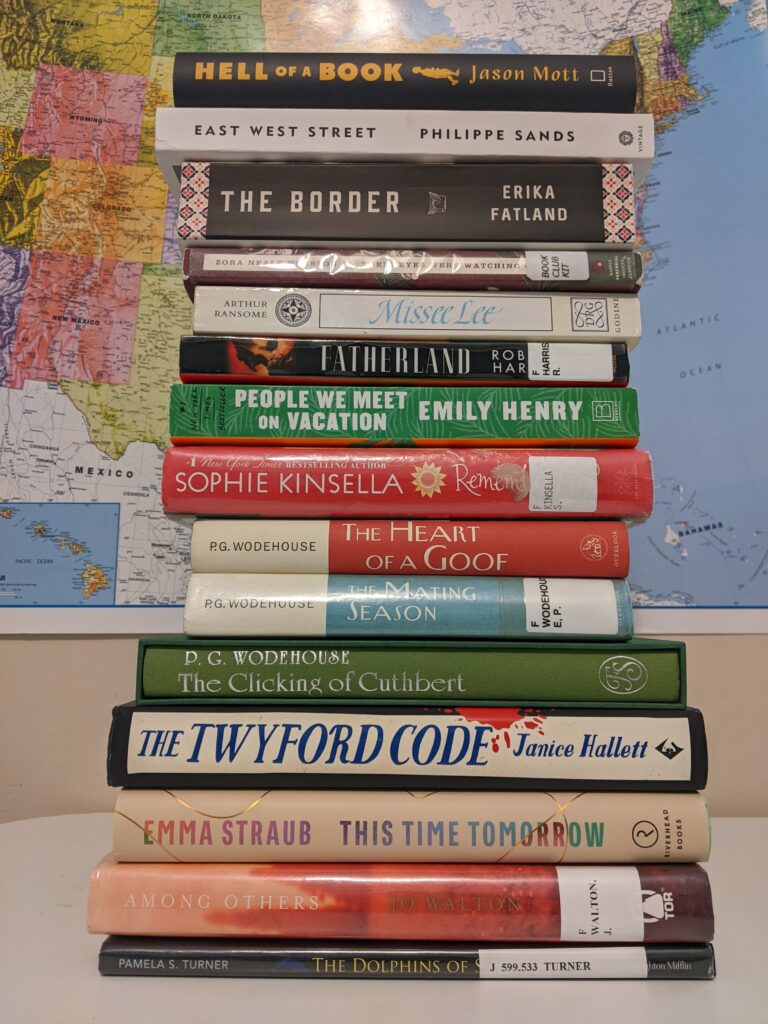
Here’s why I track my reading from the 14th to the 13th of each month, rather than by month: when my last baby was born (two years ago now), I started stacking up the books I read as I read them and taking a quick photo at the end of each month. So I have all these nice photos and can look at the dates and remember, “These are the books I read in the first month after we had the baby” – “These are the books I read when the baby was 9 months old” – etc. It would probably make sense to switch it now, but I’m already in the habit, and also, a little sentimental about it. So … here are the books I read when the baby was 23 months old.
Hell of a Book – Jason Mott – 2021
#20booksofsummer. I’m realizing as I look at this picture what a great reading month this was for me. This amazing novel by a North Carolina author won the National Book Award and is unmissable, at least for Americans. It’s a novel about an author going on a book tour … and about a boy growing up in the south and his parents wanting to protect him from the dangerous world he’ll have to live in … but that’s pretty much like saying 1984 is a book about a man who works in an office. It’s truly indescribable, it made me laugh (a lot), made me cry (a lot), and I’m definitely going to get one or the other of my book groups to read it next year.
East West Street – Philippe Sands – 2017
#20booksofsummer. “Crimes against humanity” – “Genocide.” How did humanity develop legal language to describe what happened in the 20th century and to try to bring the perpetrators of unthinkable crimes to some sort of account? This was one of the best nonfiction books I have ever read. It was hard, hard reading because the history it addresses is so heartbreakingly sad – but it’s better to know about it, isn’t it? And this book tied together the lives of real people who weren’t necessarily famous or powerful (some of them the author’s ancestors), with the lives of other people who came from similar backgrounds but did gain a degree of influence through their work and ideas – and set them all in the context of the catastrophic events of the 1930s and 40s, in a way that was different from anything I’d ever read before. Sands also took up the threads of the lives of some of the people responsible for those events, and a good bit of the book is about the Nuremburg trials. It’s divided into very short chapters, and the writing is clear, incisive and transparent. I couldn’t put it down, and would recommend it to anyone.
The Border: A Journey Around Russia Through North Korea, China, Mongolia, Kazakhstan, Azerbaijan, Georgia, Ukraine, Belarus, Lithuania, Poland, Latvia, Estonia, Finland, Norway and the Northeast Passage – Erika Fatland – translated by Kari Dickson, 2020
I read this very slowly over the previous four or five months while also reading many other things, and it became more (frighteningly) relevant every week that I was reading it. It was also exceptionally good and will be one of the best books I will have read this year, I think. Norwegian travel writer Erika Fatland, whose book Sovietistan has also been translated into English, traveled all the way around Russia without entering Russia (except I think once), through the 14 countries that border it, and wrote about her experience and the people she met. She especially focused on what it’s like for people in all of these different places to have Russia as a neighbor. I can’t imagine anyone reading it without learning a lot or without really admiring and appreciating the author.
Their Eyes Were Watching God – Zora Neale Hurston – 1937
#20booksofsummer. When I first read this, for school, I liked it but I think I hadn’t read enough books yet to realize just how great it really is. I remembered the plot, which is striking and is good in itself, but this time around I found the language and the ideas in the book just breathtaking. I personally can’t think of a stronger contender for the fabled Great American Novel.
Missee Lee – Arthur Ransome – 1941
The tenth Swallows and Amazons book, the eighth that I’ve read aloud to my kids. We are all devoted fans of these. This one was a really good shipwreck/adventure/escape story with a lot of exciting and fun moments, and was perfect for reading aloud. It’s the second of the books in the series that are different from the others in that they’re not exactly meant to be “real” (the first is Peter Duck). I changed all of Missee Lee’s mispronunciations and made other small edits to make the book more respectful of Chinese people and culture. With those edits, I’d heartily recommend this one. I have yet to read one I didn’t love! My favorite, though, is probably We Didn’t Mean to Go to Sea, book seven.
Fatherland – Robert Harris – 1992
This is an alternative history in which the Axis won the war. England is independent but just barely; the U.S. and Germany are about to achieve a new level of rapprochement as Kennedy prepares to visit in honor of Hitler’s 75th birthday. Hitler’s main real-life thugs are mostly still alive and still in power, and one of his inner circle has just been found dead. A detective named March with some secret doubts about the regime gets involved in the investigation, along with a female American journalist. This was very good, although hard and sad to read (which I really should have expected!) and it got harder as it went, as the plot focused in on the secret (in their world) history of the Holocaust.
People We Meet on Vacation – Emily Henry – 2021
This was a beach read from the month before, that I couldn’t bring myself to photograph in its proper April/May stack because every other book on that stack was either red or off-white. There were some funny moments in this book and it did turn the pages, but I don’t really plan to read more from this author.
Remember Me – Sophie Kinsella – 2008
I was looking again for a light, beach-read sort of book at some point this month (although I was not at the beach), and in theory I do like books about amnesia. I had already read another book about amnesia the month before, which also wasn’t quite right for me, Grown Ups by Marian Keyes. This one might have been almost the kind of thing I was looking for, but there was a Holocaust joke in it, which ruined the book.
The Heart of a Goof – P. G. Wodehouse – 1926
If the two above were a failed experiment in reading modern romance, this one and The Clicking of Cuthbertwere a wildly successful experiment in reading P. G. Wodehouse’s golf stories. I’ve never played golf (unless mini golf counts) but P. G. Wodehouse could make anything funny, and both of these books were hilarious. I was so disappointed when I went online and found out that there weren’t more golf books!
The Mating Season – P. G. Wodehouse – 1949
This is a Jeeves and Wooster, and an especially good one (except that they’re all especially good ones). Bug-eyed, orange-juice-drinking newt-fancier Gussie Fink-Nottle, a favorite character (except that they’re all favorite characters) wades in the fountain in Trafalgar Square – I’ve already forgotten why this requires Bertie to go visiting in a country house impersonating Gussie, but I remember it was hilarious and perfect. Jonathan Cecil reads the audiobook and it’s included in Audible Plus. You cannot lose!
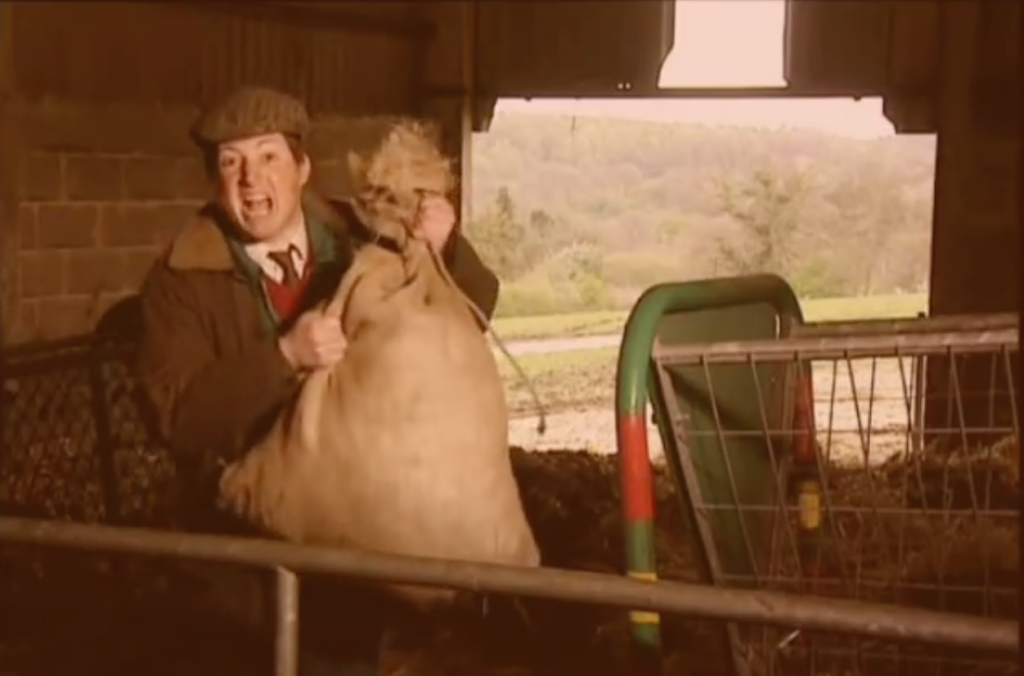
The Clicking of Cuthbert – P. G. Wodehouse – 1922
I went back and forth between listening to Jonathan Cecil’s audiobook of this and reading my lovely Folio edition, which was a birthday gift. Loved every minute of it.
The Twyford Code – Janice Hallett – 2022
This was a very satisfying and ingenious mystery/adventure/thriller. Janice Hallett must be an absolute genius. The text comprises transcripts made by a software program and there’s something very creepy and unsettling (in a good way) about the way it lands to read someone talking along and suddenly taking a deep breath hhhhh and then sighing hhhhh. (There’s a key at the beginning to guide the reader through the software’s quirks.) Edith Twyford is a very thinly disguised version of Enid Blyton and the Twyford Code itself is a message hidden in copies of her books – but that’s just the beginning. I wish her first book, The Appeal, didn’t sound way too scary/sad for me because I’d love to read more from this author. The one that’s coming in January 2023 may be too much for me too – I may wait for reviews or for someone I know to read it.
This Time Tomorrow – Emma Straub – 2022
A 40-year-old woman wakes up 16 again and has the chance to fix things in the past, and especially to try to help her father live longer. I wrote roughly half of a novel based on the same idea a few years ago before giving up on it, so that made it really interesting to see how a real author handled it. There were a few things she did with the book that I thought were really good, specifically the very positive rendering of a father-daughter relationship, and the final plot twist. Overall, though, I can’t say I would recommend the book highly, and I’m donating my own copy (should have waited for the library!). This wasn’t the main reason it didn’t impress me overly, but it did raise my eyebrows a little when the first thing the main character did in the past was to have sex with another teenager … the author carefully explained that this other teenager was 18 (so it was “legal” however you want to look at it – got that? legal); and she also had the 40-year-old part of the protagonist’s brain sort of … recede? I don’t know. Basically, she tried to make it less weird, but it didn’t work.
Among Others – Jo Walton – 2011
I’ve read very little science fiction or fantasy but have recently enjoyed reading Jo Walton’s monthly column about her wide and varied reading each month on Tor.com. This book combined a coming of age story, a grief narrative, and elements of fantasy/fairies/the supernatural. I thought it was original and interesting and it did keep me reading, but it also had some very sad plot points and one very shocking plot point, and in that sense probably wasn’t really what I was looking for at the time. My favorite part was the intrafamilial conflict about whether the main character should have her ears pierced, and what would happen if she did.
Dolphins of Shark Bay – Pamela S. Turner – 2013
Another readaloud. I normally only put longer books than this one on these stacks, but since we read it a little at a time spread out over several months, I decided to include it. I completely love this Scientists in the Field series from Clarion Books and this one had animal behavior, boats, and Australia, so it was especially a hit.
The Thousand Autumns of Jacob de Zoet – 20 Books of Summer
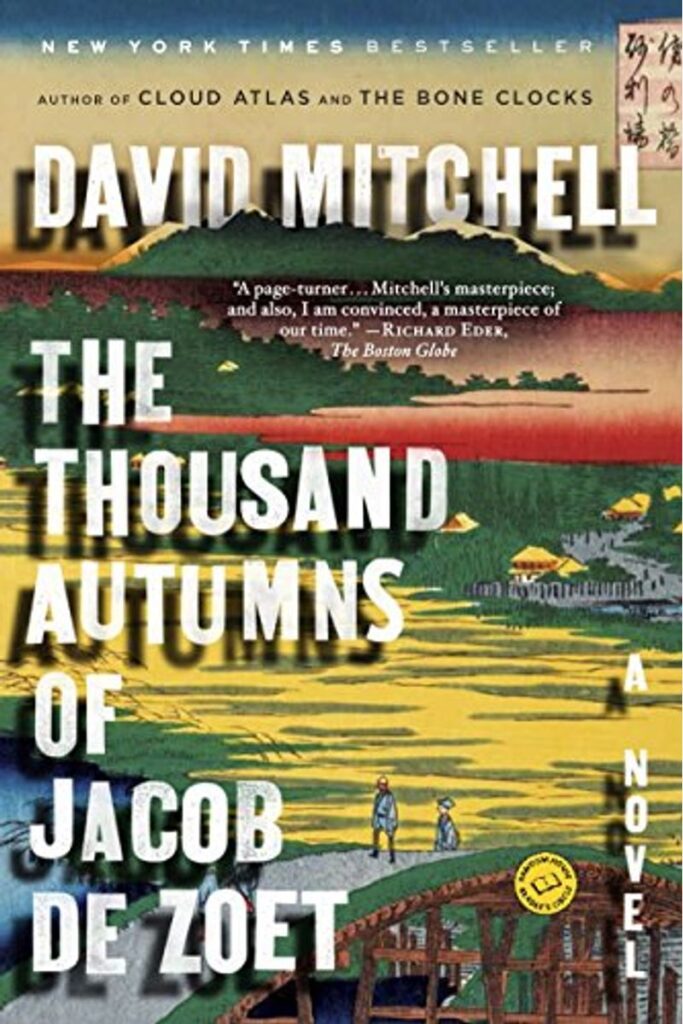
Even halfway through this 479-page novel about Dutch traders in early 19th-century Japan, I was still thinking of giving up on it. The first chapter was a nightmare to read and I had to squeamishly skim it; there were plenty of other pages that made me grimace with disgust; and in particular, one of the most important plot points was truly horrible. How on earth, then, could this possibly turn into a five-star read, by an author whose other books I want to read as soon as possible?
Mitchell did it by writing a complex, literary book that yet falls firmly in the category of “ripping yarn.” Those last 200 pages turned themselves over so quickly. The book was extremely well plotted – just one of several aspects that made reading it feel at times like watching a really good magic show. I couldn’t wait to see what Mitchell would pull out of his top hat in the next chapter, and the next, and the next.
The characters were real people, except for the monstrous super-villain, and the hope that he would get his comeuppance was one of the main things that made it so propulsive. There were so many interesting cross-cultural moments, and intricate historical detail that nevertheless never added up to that tiresome experience of watching an author try to shoehorn in all his research so none of it would go to waste. It certainly made me want to read more about Japan, particularly during this time period. This 2020 Baillie Gifford shortlisted book tells the life story of a Japanese woman born a few years before the denouement of Jacob de Zoet, and might be an interesting place to start.
I read that Mitchell wanted to “write a bicultural novel, where Japanese perspectives are given an equal weight to Dutch/European perspectives.” There were moments when I thought he wasn’t going to manage this, but in the end, I think he did. It was so interesting to read about the issues of translation between the two cultures, both literally between the two languages and metaphorically. At one point the main character asks his Japanese interlocutor in the midst of a fraught interchange, “What do I not understand?” That sort of open-handed approach to conversation, and willingness to be instructed as needed, apply beyond cross-cultural interchanges, too.
The first half of the book had plenty to recommend it too, even though the second half was what really convinced me. The trading was really interesting in itself, and you feel really invested in questions like “What’s going to happen about the copper?” And I did understand that the sometimes graceless scatological language served a purpose, situating the reader in a particular time and place when things like a high level of sanitation, or not having lice, were unrealistic for Dutch or English sailors. All in all the book’s good points far outweighed the things that made it challenging reading for me in places, and I would highly recommend it, even to readers who don’t always enjoy historical fiction or who are on the squeamish side like I am. I’ve never read anything quite like it and if I had to pick a comparison, it would actually be The Long Ships by Frans G. Bengtsson (1941). Both books are pacey, adventure-filled historical novels that create another time and place with extraordinary effectiveness, and then people that time and place with a large cast of fascinating characters. I plan to read Cloud Atlas soon and am eager to learn more about David Mitchell’s writing.
Being a Beast – 20 Books of Summer
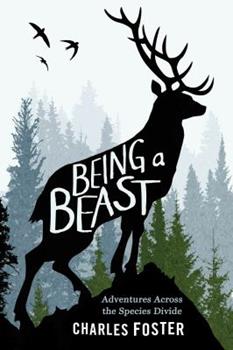
Being a Beast: Adventures Across the Species Divide – Charles Foster
2016, Metropolitan Books, 217 pp plus notes
Wow. I first heard of this book via Charles Foster’s short segment on This American Life in 2016. The segment was captivating, getting across so much of Foster’s intensity and eccentricity; and the audiobook for Being a Beast, also read by the author, is the same. I went back and forth between reading it on the page and listening, and I ended up actually doing both for many portions of the book (not at the same time) because the whole thing was so interesting and thought-provoking.
Foster has gone to great lengths to try to understand what it’s like to be a badger, an otter, an urban red fox, a red deer, or a swift. It sounds like he’s been an avid naturalist from early childhood and has kept a nature notebook throughout his life. He is also a qualified veterinarian, has a doctorate in medical law and ethics from Cambridge, and is a Fellow of Green Templeton College at Oxford. Now picture this man digging a badger sett on his friend’s farm in Wales, and living in it with his son, crawling around in the woods on all fours, and eating earthworms.
Earthworms taste of slime and the land. They are the ultimate local food and, as the wine people would say, have a very distinct terroir.
The earthworms were also mentioned in the radio segment; they grab your attention, don’t they? Come for the earthworms, stay for everything else. I learned a lot about all five of the animals in reading this book; it also started my mind in all kinds of directions as Foster raised such fascinating and important questions about the place of humans in the natural world and the extent to which we can understand the other creatures who share this incredible, threatened planet with us. I have to share this long quote, because it is so, so good:
The first [question] flows directly from heather, asphalt, and shamanism: Are there any limits to our ability to choose?
The fact that we have at least some autonomy is awesome and intimidating. We’re used to thinking that autonomy is most critically on trial in dramatic, occasional situations—such as when we’re considering the right to assisted suicide. But surely it’s the day-to-day choices that are the most terrifying and repercussive. Listen: you can choose whether to get up early, run around a field, have a cold bath, and then read Middlemarch. Or stay in bed and watch shopping TV. That’s astonishing. I can never get over it. That’s a choice between life and death. Therefore choose life.
214-215
The chapter on swifts was my very favorite. No one could fail to marvel at a bird that, from the time it fledges from its nest until it returns to a chimney four years later to build a nest for its own offspring, never touches down for a moment. “Until it flew into our roof above my head it hadn’t touched the ground, or a tree, or a building, or anything but insects and the air in four years.” (189) Just think: there could be swifts sleeping on the wing above you right now, two miles into the atmosphere, too high up for you to see even with high-powered binoculars.
It made me want to build a freestanding chimney in our back yard (a curse upon Homeowners Association rules!). We did live next door to a 1914 farmhouse for five years and got to watch that house’s chimney swifts in their amazing flights. This summer, a pair of barn swallows built a nest above the security camera at our neighborhood pool, and watching their four babies hatch, grow, and fledge has been an amazing highlight of our summer. But I haven’t seen a swift for years. I hope to read Foster’s recent book that focuses more on swifts, The Screaming Sky, very soon, and several of his other books also look appealing. I think it must be wonderful to hear about his experiences as a Cro-Magnon hunter-gatherer and a Neolithic farmer in his 2022 book Being a Human: Adventures in 40,000 Years of Consciousness. Since I enjoyed him as a reader so much, though, I’m disappointed that he doesn’t read the audiobook for that one.
Because Being a Beast made me laugh, made me cry, and made me see nature in an entirely new light, I would highly recommend it even to people who don’t normally read nature books.
20 books I hope to read this summer

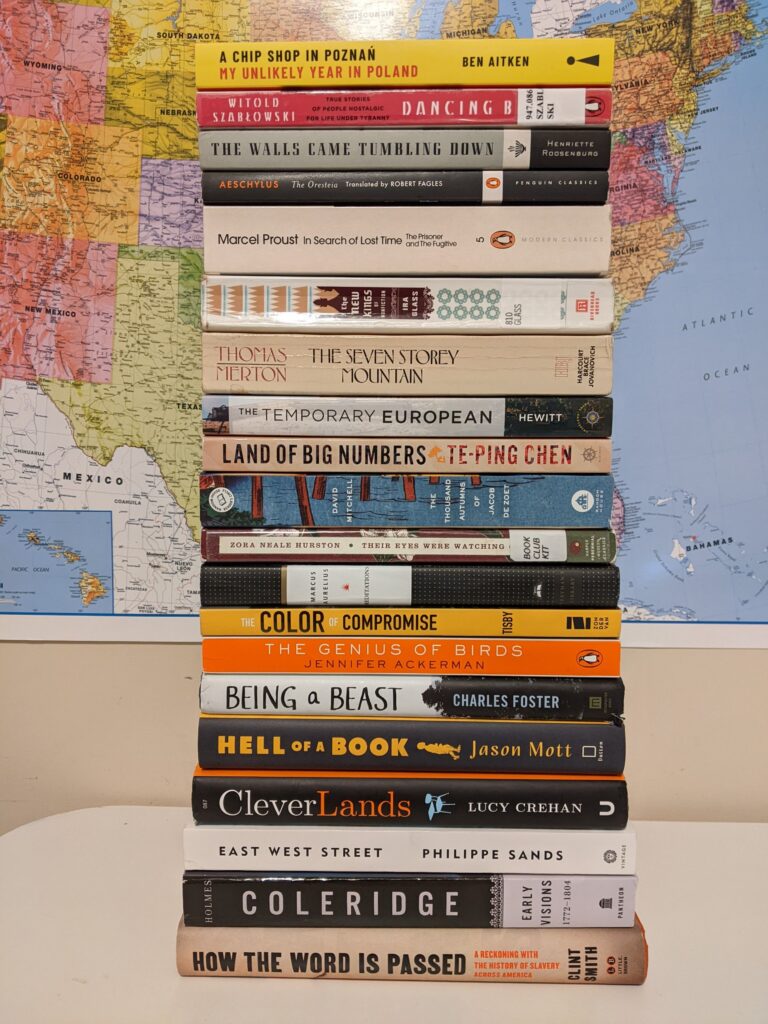
I’m joining in with the challenge that Cathy at 746 Books hosts. It’s so fun to see everyone’s plans!
A Chip Shop in Poznan: My Unlikely Year in Poland – Ben Aitken
I bought this from Waterstones as part of their Read for Ukraine promotion. “One of the funniest books of the year,” says somebody on the cover.
Dancing Bears: True Stories of People Nostalgic for Life Under Tyranny – Witold Szablowski
This looks great and was recommended by Rennie at What’s Nonfiction. The author, who is Polish, reports on actual dancing bears in Bulgaria and what happened when they were released into a wildlife refuge; and then on conversations and encounters in Eastern Europe, the former USSR, and Cuba, with people who likewise have been “released” from authoritarian control.
The Walls Came Tumbling Down – Henriette Roosenburg
A World War II memoir by a Dutch woman who was a political prisoner in Germany. James Mustich of 1000 Books to Read Before You Die, a book I dearly love, listed this among the top three or four books he would give to an alien civilization to explain what it means to be human.
The Oresteia – Aeschylus
This was one of the other books James Mustich would give to an alien civilization. I have already stalled out on this once. Hopefully the challenge will give me some extra momentum.
The Prisoner and The Fugitive – Marcel Proust
I have been reading In Search of Lost Time very slowly, one volume every few years. It’s an absolute joy to read but also challenging and I have a variety of fears about how it’s going to end.
The New Kings of Nonfiction – ed. Ira Glass
This very promising book came up in a library search for Susan Orlean. It includes 14 articles selected by Ira Glass and published in 2007. I’ve already looked into this one and love the piece by Malcolm Gladwell, about people who seem to know everyone, and how we know the people we know. There are also pieces by Michael Lewis, David Foster Wallace, and Michael Pollan.
The Seven Storey Mountain – Thomas Merton
This book has been described as “a twentieth-century form of The Confessions of St. Augustine” and “the odyssey of a soul.” I’ve never read anything by Thomas Merton and have been meaning to read to this one for a while.
The Temporary European – Cameron Hewitt
I first saw this at The Captive Reader. The author has been “Rick Steves’ right hand man” for more than 20 years, and gathered these travel pieces together during the first year of the pandemic. In the introduction Rick Steves describes it as “some of the best travel writing I’ve read. Reading it during COVID was, for me, the next best thing to a plane ticket.” It will still be a while before I’ll be on a plane again so this should be perfect for me right now.
Land of Big Numbers – Te-Ping Chen
This book of short stories, according to Jennifer Egan, “offers intimate glimpses of the seductive power of state control: the Faustian bargaining it requires of its citizens, the landscapes and lives it forces them to discard in exchange for material prosperity.”
The Thousand Autums of Jacob de Zoet – David Mitchell
Historical fiction set in Japan, highly recommended by Jo Walton via Jo Walton Reads.
Their Eyes Were Watching God – Zora Neale Hurston
Rereading this for book group in June.
Meditations – Marcus Aurelius
I started this at the beginning of the year and stalled out, hope to finish it over the summer. It’s SO good but slow reading with thousands of endnotes.
The Color of Compromise: The Truth about the American Church’s Complicity in Racism – Jemar Tisby
I have heard so many good things about this book, which “takes readers back to the roots of sustained racism and injustice in the American church.”
The Genius of Birds – Jennifer Ackerman
The author studies birds all over the world and reveals how intelligent and amazing they are.
Being a Beast – Charles Foster
I have wanted to read this ever since I heard the author appear on This American Life, describing how he tried to learn what it was like to be a badger, by digging burrows, blindfolding himself (I think?), working on his sense of smell, and eating earthworms.
Hell of a Book – Jason Mott
I’m already halfway through this one. It’s amazing. I’m folding down corners on almost every page because the writing is incredible and it’s also really thought-provoking. It has already made me laugh and made me cry and I’m feeling really scared about the ending.
Clever Lands – Lucy Crehan
The author, a teacher in an inner-city school in London, traveled to Finland, Japan, Singapore, China (specifically Shanghai), and Canada — countries whose students far outperform those in the UK and the US on international standardized tests — and visited classrooms to see for herself what was going so well in these places.
East West Street – Philippe Sands
I’m also halfway through this story of the author’s investigations into the lives of his grandfather and two other men who lived in the 20th century in Lviv, which is now in Ukraine and has previously been under Austro-Hungarian, Polish, German, and Soviet control. The other two men are Raphael Lemkin and Hersch Lauterpacht, who were the authors of the terms “genocide” and “crimes against humanity,” respectively. This will clearly be one of the best books I will have read this year or probably any year.
Coleridge: Early Visions: 1772-1804 – Richard Holmes
Footsteps, a collection of shorter pieces on various subjects by Richard Holmes, was wonderful and I’m sure this will be too.
How the Word is Passed: A Reckoning with the History of Slavery Across America – Clint Smith
Between October 2017 and February 2020, the author visited places where “the story of slavery in America lives on,” starting with Monticello.
And seven alternates:
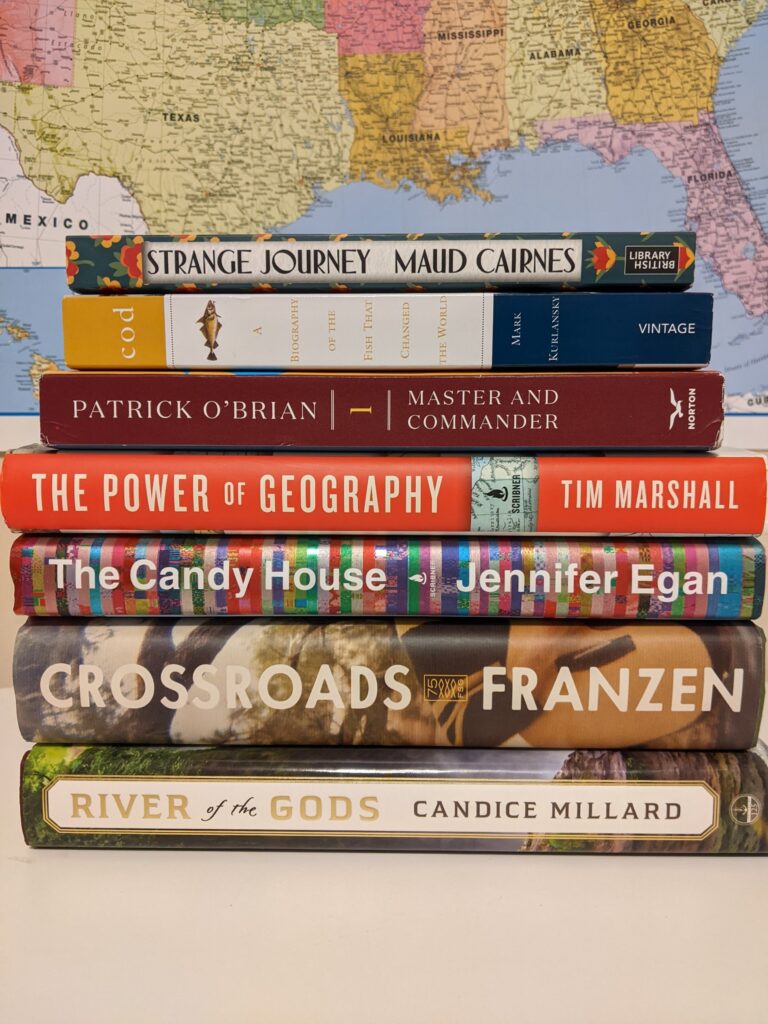
Strange Journey – Maud Cairnes
Cod: A Biography of the Fish that Changed the World – Mark Kurlansky
Master and Commander – Patrick O’Brian
The Power of Geography – Tim Marshall
The Candy House – Jennifer Egan
Crossroads – Jonathan Franzen
River of the Gods – Candice Millard
“…and books, we know, Are a substantial world, both pure and good. Round these, with tendrils strong as flesh and blood, Our pastime and our happiness will grow.”
– William Wordsworth, “Personal Talk”

